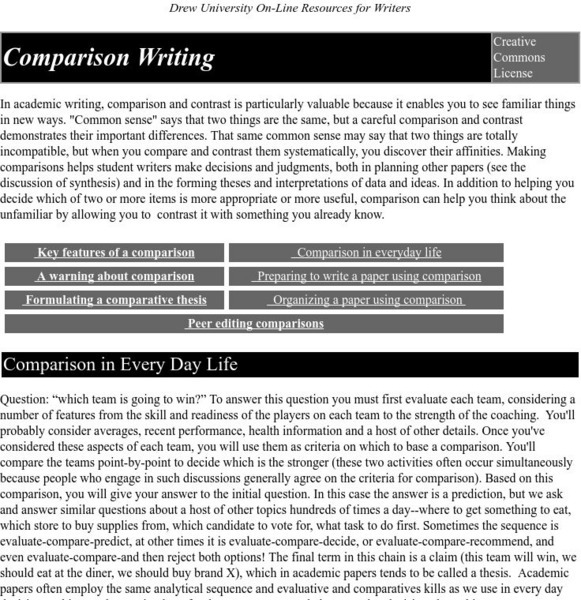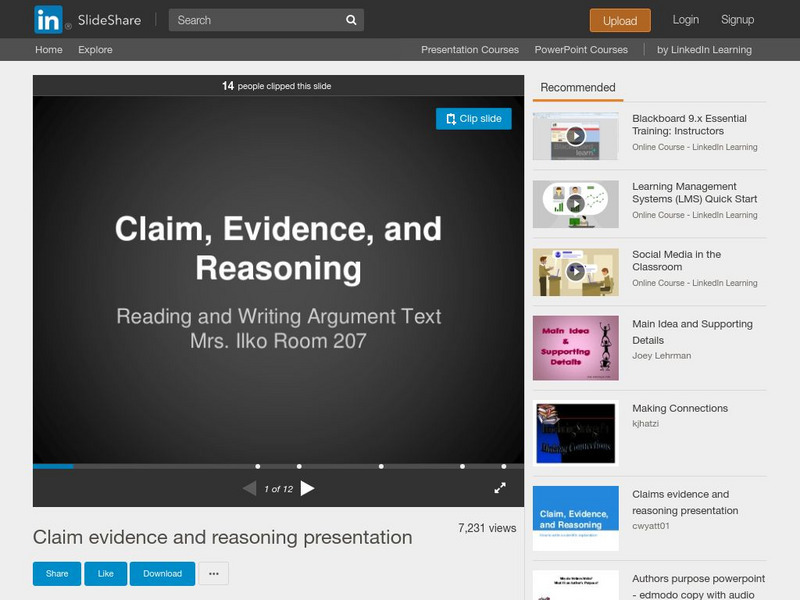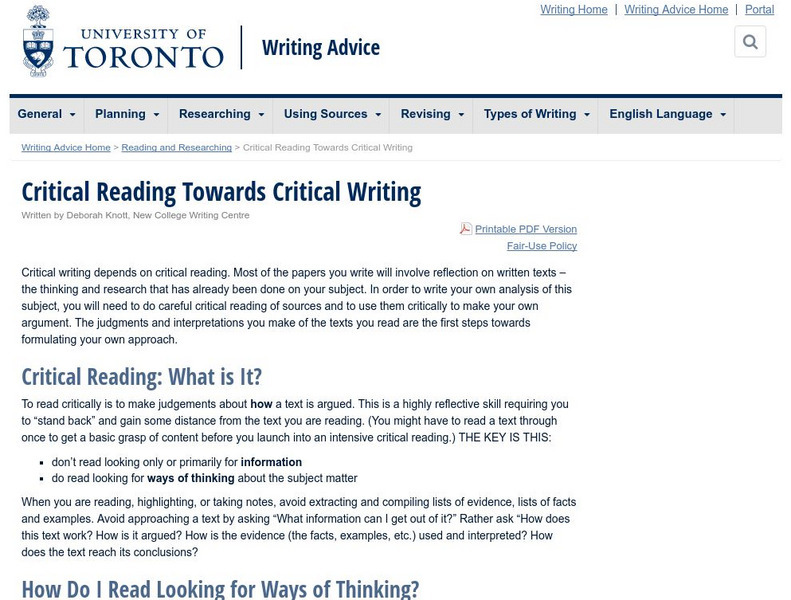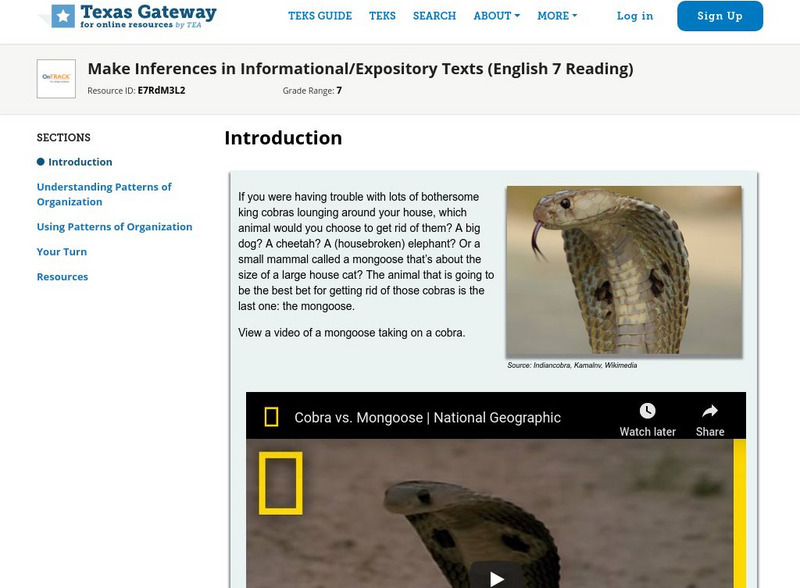Curated OER
Mc Graw Hill: Part 2 Reading: Informational Text: Evaluate Arguments and Claims
This article will help you evaluate informational text to determine whether an author's argument is supported by evidence or not. Click on Model to see a model with explanations and then click on Practice.
Other
Drew University: Resources for Writers Comparison Writing
Sections of this site include key features of the comparison essay, comparisons in daily life, formulating a thesis, preparing to write, and organizing a comparison essay. The site also includes a paragraph of caution when writing about...
Grammarly
Grammarly Handbook: Analysis
This page explains that analysis is crucial to the success of a paper as it answers the questions how and why and shows the reader that the writing is knowledgable. Logic and development work together to make the analysis clear. Examples...
Brown University
Brown University: Critical Writing and Thinking
Resource explains exactly what critial writing and thinking are, questions to help you think critically, paper writing tips, troubleshooting, and more.
iCivics
I Civics: Games: Argument Wars
Games in which players act as lawyers arguing head to head before a judge about real Supreme Court cases.
Polk Brothers Foundation Center for Urban Education at DePaul University
Depaul University: Center for Urban Education: Evaluate Support for a Claim[pdf]
This resource provides a downloadable worksheet to use after reading a nonfiction text. Students will evaluate an author's support for a claim by answering the questions and prompts provided on the worksheet.
E Reading Worksheets
E Reading Worksheets: Fact and Opinion Worksheets
Fact and opinion practice exercises, answer sheets, and explanation summaries are included on this tutorial site. Worksheets are tiered in levels of difficulty.
Tom Richey
Slide Share: Claim Evidence and Reasoning
A slideshow with twelve slides about reading or writing an argument, analyzing the claim and looking at how it is supported with observation, evidence, and reasoning.
University of Toronto (Canada)
University of Toronto: Critical Reading Towards Critical Writing
Aimed particularly towards writing about non-fiction, this site describes ways to think about what you read so you can write more clearly. Focuses on analyzing the "ways of thinking" that an author uses so you can evaluate the validity...
Polk Brothers Foundation Center for Urban Education at DePaul University
De Paul University: Center for Urban Education: Evaluate the Strength of Evidence [Pdf]
This resource provides a downloadable worksheet that will assist students after they read a piece of nonfiction. Students will answer guided questions to help them determine the strength of evidence used when supporting a claim....
Grammarly
Grammarly Handbook: Logic in Argumentative Writing
An explanation and examples of several different types of logic that can be used in argumentative writing.
Scholastic
Scholastic: Informational Text: Reading Response: Claim Evldence Reasoning [Pdf]
This graphic organizer can be used with students when they read informational text. Students will identify a claim, list text evidence that supports the claim, and explain how the information can be used for their future understanding of...
Texas Education Agency
Texas Gateway: Make Inferences in Informational/expository Texts
[Accessible by TX Educators. Free Registration/Login Required] Use different organizational patterns as guides for summarizing and forming an overview of different kinds of expository text while distinguishing factual claims from...
Other
Bbc: H2g2 Circular Reasoning
Excellent definition and discussion of the term "Circular Reasoning," including a couple of very clear examples.
Quizlet
Quizlet: Elements of an Argument Test
Argument essay terms are included on this test over the following words: argument, claim, support, reasons, evidence, and counterargument. Six multiple choice questions are provided on this assessment.
Ohio University
Ohio.edu: Point of View and Narrative Voice
This is an article defining point of view, explaining the types of point of view, and discussing voice and tone. It was originally published at http://teenwriting.about.com/library/weekly/aa111102e.htm.
Other
Tidewater Community College: Book or Article Review or Critique Guidelines
Many students are not sure what type of information to include in a book or article review. This site provides some general guidelines. It covers not only the type of content to be included but also the format.
CommonLit
Common Lit: Text Sets: Argument, Bias, and Persuasion
Collection of 43 Grade-Leveled texts (6-12)on the topic Argument, Bias, and Persuasion. Have students track arguments through texts as they examine logical reasoning, bias, and persuasive techniques such as emotional appeals, character...
Other
Blackboard: Author's Point of View (Attitude and Tone)
Learn about author's attitude and tone, and see examples of tone used to convey nostalgia, cynicism, and sentiment in a text. This is an excellent resource for helping students identify key words and phrases that give clues about the...
Other
Park View Middle School: Mrs. Marro Sports Argument Writing
Numerous resources are provided to support the instruction of the argument essay.
Houghton Mifflin Harcourt
Holt, Rinehart and Winston: Writer's Guide: Persuasive Essay
Follow the framework on this page to construct a persuasive essay on any topic. Click on Writer's Model in the upper right to see a Shockwave presentation highlighting how to use the suggestions. W.9-10.10 Write Routinely
Other
Gallaudet University: English Works: Guide to Different Types of Essays
English Works site has suggestions on how to write an essay to convey helpful information. This site offers examples of eight different types of essays and graphic organizers.
Annenberg Foundation
Annenberg Learner: Journey North: Reading Strategies: Make Inferences and Draw Conclusions
Learn how to go beyond the literal meaning of a text by using a list of guiding questions to make inferences and draw conclusions.
Quia
Quia: Reading Detective Drawing Conclusions 7
Read a short text and then choose the correct inference or conclusion in this four question quiz.









![Scholastic: Informational Text: Reading Response: Claim Evldence Reasoning [Pdf] Graphic Scholastic: Informational Text: Reading Response: Claim Evldence Reasoning [Pdf] Graphic](https://content.lessonplanet.com/knovation/original/244734-74184753ee53d6872b10ba36f1639585.jpg?1661510818)




